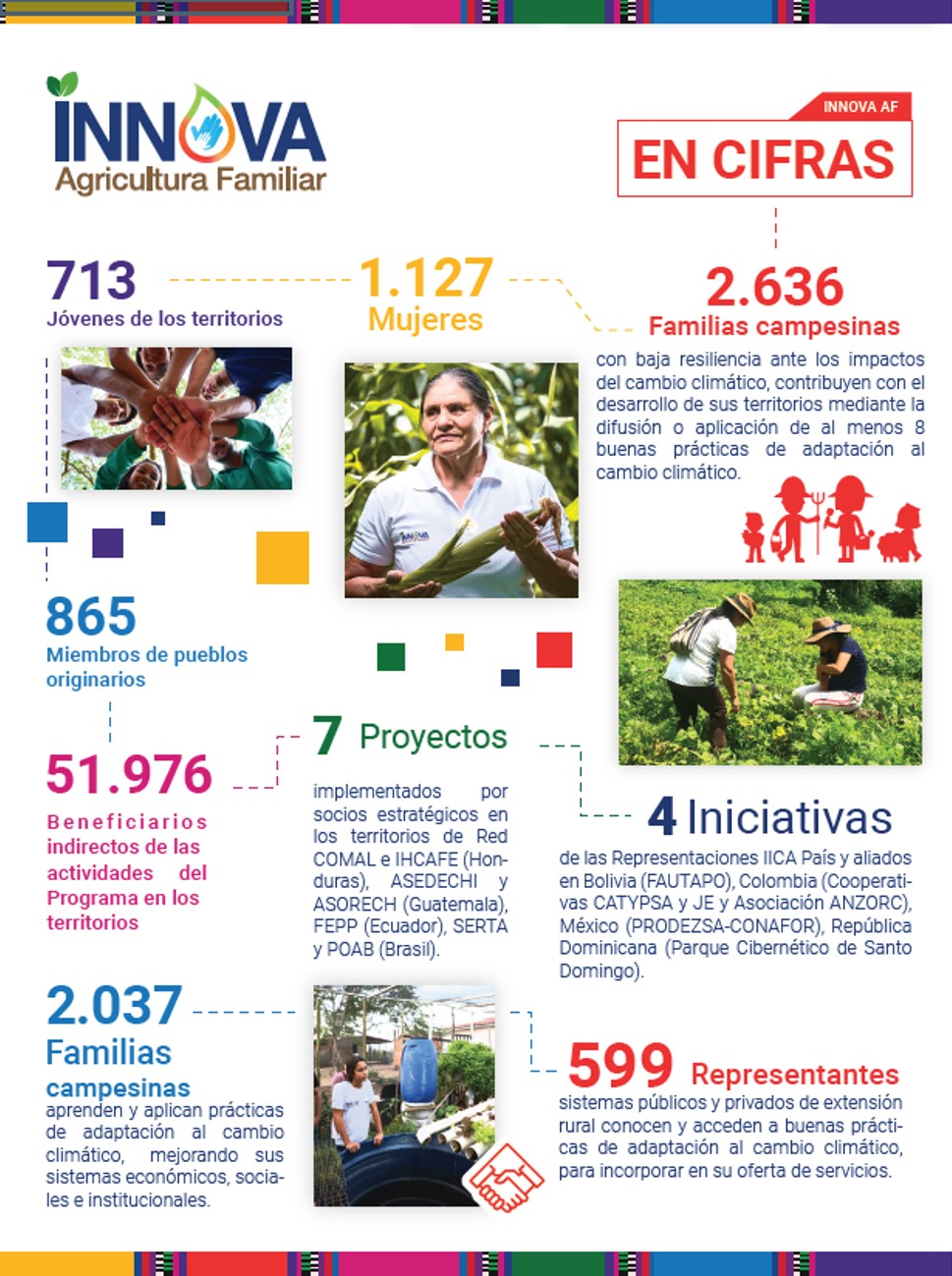The initiative was designed to facilitate the transfer of knowledge and innovative practices for climate change adaptation in family farming and was implemented in Bolivia, Brazil, Colombia, Dominican Republic, Ecuador, Guatemala, Honduras, and Mexico.

San Jose, 7 November 2022 (IICA). The Knowledge Management for the Adaptation of Family Farming to Climate Change (INNOVA-AF) project—implemented in eight countries of the Americas by the International Fund for Agricultural Development (IFAD) and the Inter-American Institute for Cooperation on Agriculture (IICA)—has benefitted 2,636 families in the last three years, by improving their climate adaptation practices and equipping them with knowledge to enhance their standard of living.
The INNOVA AF program was instituted in rural areas in Bolivia, Brazil, Colombia, Dominican Republic, Ecuador, Guatemala, Honduras, and Mexico between 2019 and 2022, involving 713 young people, 1127 women and 865 members of indigenous communities.
The objective of the program was to generate and transfer innovations and knowledge to equip family farmers to adapt to new conditions arising from climate change. More than 60 innovations in technology, products, technical instruments, capacity building and governance were implemented, which will inform the development of differentiated public policies for small-scale agriculture.
Rossana Polastri, IFAD Regional Director for Latin America and the Caribbean, remarked that, “This has been one of the most successful programs undertaken in partnership with IICA, as it allowed us to lead efforts and to assist in making climate change adaptation in family farming a reality”.
“We are now reaping the rewards of the project and thanks to the trust placed in us by IFAD and the eight countries, it has been a success. The new global context and the explosion of technology have also been taken in account in the project’s systematization of best practices”, said Miguel Arvelo, IICA’s Chief of Staff and Representative in Costa Rica.
The project strategy was to implement innovative practices in climate change adaptation, through eleven initiatives in eight countries. Moreover, the focus was on the systematization, dissemination and reuse of knowledge gained from these and other similar practices, as well as the development of rural networks.
Participants from rural areas in the eight countries took part in the closing session of INNOVA AF, sharing their experiences and lessons learned. Also in attendance were organizations that undertook initiatives in the field, namely POAB, AS-PTA, SERTA, FEPP, Red COMAL, IHCAFE, ASEDECHI, ASORECH; and strategic partners, such as the National Semi-Arid Institute (INSA) of Brazil; the Prefecture of Loja and the Consortium of Provincial Autonomous Governments of Ecuador; Mexico’s Secretariat of Agriculture and Rural Development (SADER); PRODEZSA-CONAFOR and FAUTAPO of Bolivia; and UNDP Colombia.
“Implementing innovative, climate change adaptation practices bolsters the resilience of rural areas”, remarked Claus Reiner, Director of IFAD in Brazil. “The countries have put forward a diverse range of solutions, which have richly enhanced the territories and their organizations, while also fostering the generation of knowledge in the field and its adoption by the farmers. This will be further scaled up with the partners that have contributed to INNOVA AF”.
“This initiative is having an impact on rural areas and the ongoing scaling-up processes continue to provide new opportunities and initiatives that will directly affect mitigation and climate change adaptation in these places”, said Miguel Altamirano, Technical Coordinator of INNOVA AF.
“Today, Agriculture 3.0 is no longer sufficient and we now require food production based on precision agriculture. Today we are seeing how IICA, with the support of its partners, has been evolving at this time when it is required”, said Eduardo Robert, Executive Chairman of Costa Rica’s Institute of Rural Development (INDER).
As a legacy of the project, more than 100 manuals, technology booklets and demonstration videos on innovative practices and technologies were prepared. Also published was the document Los desafíos de la agricultura familiar ante el cambio climático. Construyendo la transición rural en América Latina (Spanish only), which outlines the innovations, scaling-up strategies and lessons learned from INNOVA AF. All of this will inform the conceptualization of new rural development models focusing on climate change adaptation.
The materials can be accessed from IICA’s institutional repository.
The innovations and their impact were presented as part of a knowledge-sharing workshop and closing event for INNOVA AF entitled Rutas de Innovación para la Adaptación de la Agricultura Familiar al Cambio Climático.
More information:
Institutional Communication Division.
comunicacion.institucional@iica.int










